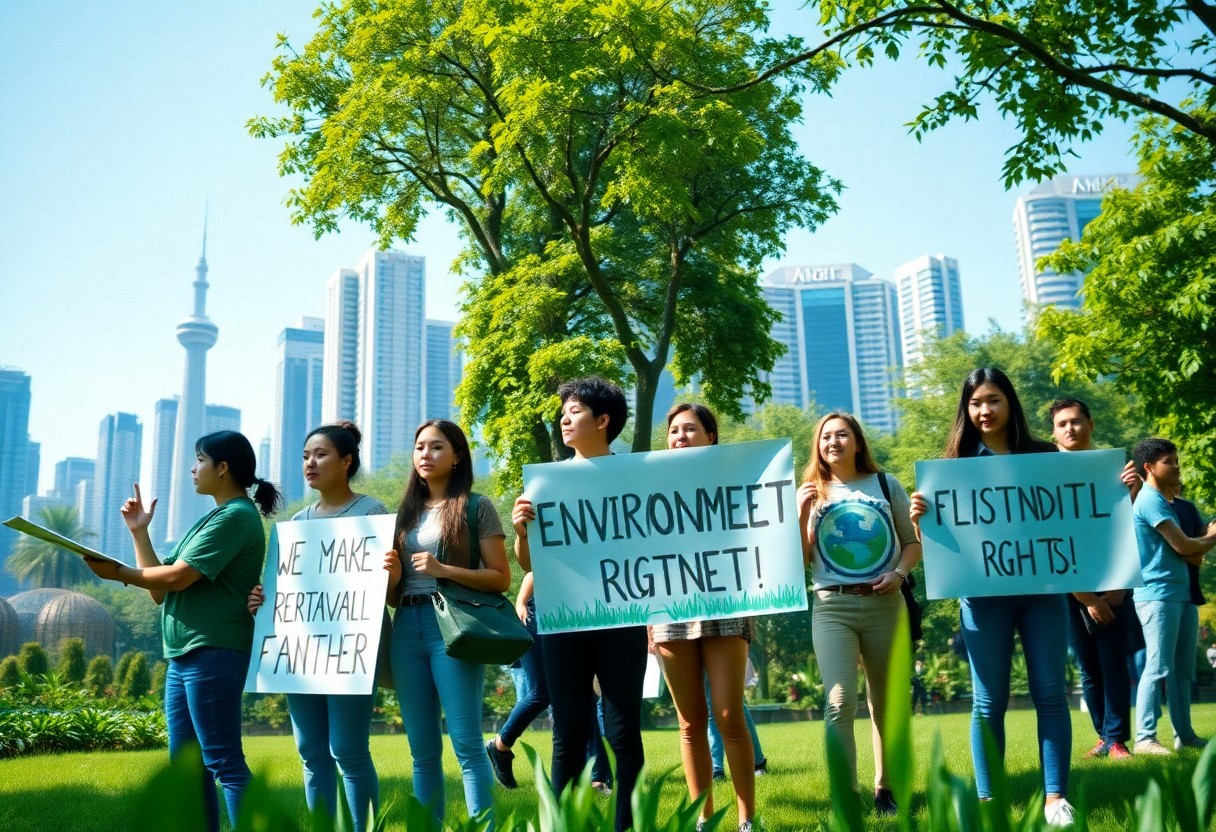You may be considering advancing your education in the ever-relevant field of environmental ethics. The Master of Environmental Ethics (MEE) equips you with the philosophical tools and frameworks necessary to address pressing environmental issues. In this program, you will explore the moral implications of human interaction with the natural world, and develop the critical thinking skills needed to advocate for sustainable practices. By understanding the ethical dimensions of environmental policies, you can make a significant impact on your community and beyond.

Key Takeaways:
- The Master of Environmental Ethics (MEE) program focuses on the intersections of philosophy, ethics, and environmental issues, equipping students with the skills to analyze and address complex ecological challenges.
- Students in the MEE program engage with a wide range of topics such as climate change, conservation, sustainability, and environmental justice, fostering a holistic understanding of human interactions with the natural world.
- The program typically emphasizes interdisciplinary approaches, combining insights from social sciences, humanities, and natural sciences to prepare graduates for careers in policy-making, advocacy, education, and research.
The Ethical Frameworks Shaping Environmental Responsibility
Ethical frameworks provide the foundation for understanding our responsibilities toward the environment. Different philosophical perspectives, such as deep ecology and utilitarianism, significantly influence environmental policies and personal actions. By exploring these frameworks, you gain insight into the ethical considerations that guide environmental decision-making and initiatives aimed at sustainability. These principles not only frame how you engage with nature but also inform collective action on global environmental challenges.
Deep Ecology: Valuing Nature Beyond Human Needs
Deep ecology emphasizes intrinsic value in non-human entities and ecosystems, proposing that nature should be respected and preserved regardless of its utility to mankind. This perspective challenges anthropocentrism by asserting that all living beings possess inherent worth, leading to a broader understanding of ecological relationships. You may find yourself advocating for policies that protect wilderness areas or support conservation efforts, arising from a deep ecological perspective that seeks harmony with nature.
Utilitarianism in Environmental Decision-Making
Utilitarianism evaluates actions based on their outcomes, promoting those that maximize overall happiness and minimize harm. In environmental decision-making, you might consider the benefits and detriments of an action—like a new industrial project—by weighing economic gains against potential ecological damage, assessing how thousands of lives could be affected. This approach not only balances immediate human needs but also factors in long-term consequences for the planet.
This ethical framework leads to cost-benefit analyses that are crucial in environmental policy-making. For instance, when evaluating a new dam project, a utilitarian approach would assess how many communities benefit from renewable energy production versus the ecological and social repercussions, such as displacing local wildlife and populations. Evidence from cases like the Three Gorges Dam in China—which sparked debate over the balance of economic growth and environmental sustainability—underscores how utilitarianism can guide complex decisions. By applying this perspective, you enhance your ability to make informed choices that consider both human welfare and ecological integrity.
The Role of Policy in Environmental Ethics
Policies play a fundamental role in shaping the ethical standards applied to environmental conservation and sustainability. They establish guidelines that dictate how society interacts with natural resources, influencing behaviors and practices. Through legislation and regulation, you can motivate individuals and organizations to prioritize ethical considerations, ensuring that environmental protection becomes an integral part of societal values. This intersection between policy and ethics fosters a framework where environmental stewardship is not just encouraged but is mandated, promoting a collective responsibility towards our planet.
Environmental Justice: Frameworks for Fairness and Equity
Environmental justice addresses the inequitable distribution of environmental burdens and benefits, ensuring that all communities, especially marginalized ones, receive fair protection and access to a healthy environment. You see, this movement seeks to highlight and rectify the disparities that often leave low-income and minority communities vulnerable to pollution and environmental hazards. By advocating for policies that promote equitable resource management and decision-making, you help pave the way for fairness and social equity within environmental ethics.
International Agreements and Their Ethical Implications
International agreements, such as the Paris Agreement, serve as ethical frameworks that guide nations in their commitment to combating climate change and promoting sustainability. Through these agreements, you recognize that protecting the environment requires collective action and accountability at a global level. Each party is ethically obliged to contribute to solutions while considering the interests and needs of developing nations, fostering a sense of shared responsibility across borders.
The ethical implications of international agreements extend beyond mere compliance; they create a moral obligation for nations to support one another in achieving set goals. For example, developed countries often bear greater responsibility for historical emissions, prompting debates on financial and technical support for developing nations. According to the United Nations, a common but differentiated responsibility acknowledges this imbalance, ensuring that efforts toward environmental sustainability are equitable and just. By participating in such agreements, you contribute to fostering an international ethic that values cooperation and accountability in addressing global environmental challenges.
The Intersection of Business Practices and Ethical Stewardship
Aligning business practices with ethical stewardship is not merely a trending topic; it has become a fundamental necessity for modern organizations. You must recognize how companies are increasingly held accountable for their environmental impact while navigating complex supply chains and customer expectations. Authentic ethical stewardship transcends compliance and motivates businesses to innovate solutions that benefit both the environment and their bottom line. As stakeholders demand transparency, the intersection of business practices and ethical stewardship presents an opportunity for companies to build long-lasting value and foster trust within their communities.
Corporate Social Responsibility: More than Just Greenwashing
Corporate Social Responsibility (CSR) initiatives should reflect genuine commitment rather than mere marketing ploys. Many organizations fall into the trap of greenwashing—promoting an illusion of environmental responsibility while failing to implement sustainable practices. You can identify effective CSR strategies characterized by measurable outcomes, community engagement, and transparent communication. By prioritizing authentic CSR, companies not only enhance their brand image but also contribute meaningfully to societal challenges, making a tangible positive impact on the planet.
The Economics of Sustainability: Profit vs. Planet
Balancing profit with sustainability reflects a complex challenge for many businesses today. You might wonder if prioritizing environmental measures sacrifices short-term gains, but an increasing number of studies illustrate that sustainable business practices can generate long-term profitability. Companies adopting eco-friendly technologies frequently experience reduced operating costs due to energy savings, while sustainable brands enjoy higher consumer loyalty. Investments in sustainability are not merely ethical imperatives; they align with sound business strategies that can deliver critical financial returns.
The concept of “profit vs. planet” can be misleading, as emerging data indicates that sustainability integration often leads to a competitive advantage. For instance, according to a McKinsey report, companies with sustainable practices outperform their peers financially. You might discover that investing in renewable energy sources, improving waste management, or sourcing locally not only enhances your reputation but also reduces costs in the long run. By adopting sustainable practices, you can contribute positively to the environment while enjoying the potential for substantial economic benefits.
Individual Action: The Power of Everyday Choices
Your choices have far-reaching impacts on the environment, shaping everything from resource consumption to waste generation. Simple decisions, such as opting for reusable bags, reducing meat consumption, or supporting local, seasonal foods, can collectively lead to significant environmental benefits. By consciously integrating sustainability into your routine, you become part of a broader movement that prioritizes ecological health. Understanding that your individual actions contribute to this larger narrative empowers you to make daily choices that align with your ethical stance on environmental stewardship.
Sustainable Living: Actions for Personal Responsibility
Advocacy and Activism: How Citizens Can Influence Change
Your voice holds power in advocating for environmental causes, fostering a culture of activism that can lead to meaningful change. By participating in community forums, signing petitions, or joining environmental organizations, you amplify the urgent call for action. Educating neighbors about conservation initiatives and lobbying for sustainable practices at a local level can significantly shape policy and community standards. Remember that even small groups can mobilize effectively, utilizing social media platforms to reach wider audiences. Your commitment to advocacy can inspire collective efforts that truly change the landscape of environmental ethics.
Engaging in advocacy and activism opens pathways to influence policy changes and hold institutions accountable. Case studies highlight how grassroots movements have successfully pressured local governments to adopt greener practices— like reducing plastic waste or increasing green space. You can leverage your community networks to raise awareness about environmental injustices, creating a ripple effect that encourages others to act. Engaging with local representatives, participating in town hall meetings, or organizing clean-up events demonstrates that collective actions, when driven by passionate individuals, can lead to transformative environmental policies. Each small action builds momentum, fostering a culture of change that resonates far beyond your immediate surroundings.

Reimagining Future Generations’ Rights
Your decisions today have a lasting impact on the environment and the rights of future generations. Embracing the notion of intergenerational equity encourages society to consider the well-being of those not yet born. This perspective demands that current generations prioritize sustainability, conserving resources, and protecting ecosystems, thereby ensuring a healthy, viable planet for future inhabitants. By reevaluating societal roles and responsibilities, we can foster a sense of justice that propels you towards a more ethical relationship with the environment.
Intergenerational Justice: Ethical Obligation to the Future
Ethical obligations to future generations hinge on the concept of intergenerational justice, which argues that you hold moral responsibilities to protect the rights and interests of those yet to come. This perspective challenges you to think beyond immediate benefits and weigh the potential long-term consequences of today’s choices. By pursuing policies that mitigate climate change, conserve biodiversity, and ensure resource availability, your actions can foster an atmosphere where future generations can thrive. Such commitments represent a necessary evolution in ethical frameworks, emphasizing both moral accountability and solidarity across time.
The Role of Education in Fostering Environmental Ethics
Education serves as a powerful tool in cultivating environmental ethics, equipping you with the knowledge and skills necessary to navigate complex sustainability issues. By integrating environmental topics into curricula, you can develop a deep understanding of ecological principles and the interconnectedness of all life. Initiatives such as hands-on learning experiences, outdoor classrooms, and community projects can further inspire a sense of stewardship, empowering you to make informed choices that benefit both the planet and society. Ultimately, education lays the foundation for a more environmentally conscious citizenry, ready to tackle the challenges of the future.
Summing up
Following this exploration of the Master of Environmental Ethics (MEE), you should recognize its significance in shaping your understanding of the ethical responsibilities we hold towards the environment. By engaging with this program, you enhance your ability to critically analyze environmental issues and advocate for sustainable solutions. The MEE empowers you to integrate ethical considerations into environmental policy and practice, enabling you to become an informed leader in the quest for ecological harmony and social justice.

